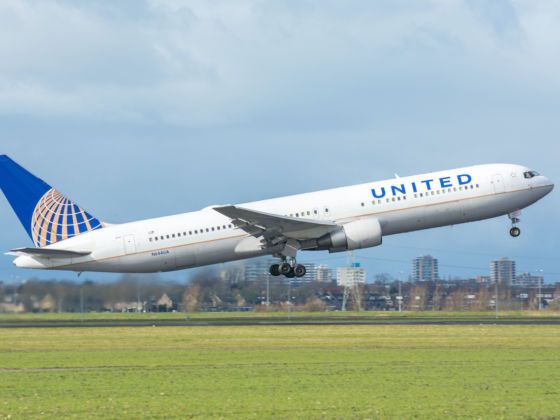The headlines haven’t been kind to United Airlines this week. “United Airlines is Firing Workers Over Vaccine Noncompliance” reads the New York Times. CNBC writes in big bold letters, “Nearly 600 United Airlines Employees Face Termination for Failing to Comply with Vaccine Mandate.” The Independent takes a more visceral tact, saying, “United Airlines to Axe Hundreds of Unvaccinated Staff.”

United Airlines Fired 1% of Its Staff for Refusing Vaccinations, and It’s About Time
Tough words, right? Hundreds of staff. Axe. Noncompliance. It’s no secret that headlines are often crafted to create the impression of conflict, but in this case, they unfairly cast United Airlines as the bad guy.
On August 6, United announced that the airline would require all of its 67,000 US-based employees to be vaccinated by a deadline of September 27. When the mandate was first put in place, the US was seeing a seven-day average of 106,000 cases per day — among the most cases per capita anywhere in the world. Now that the deadline is here, an overwhelming 99 percent of United’s employees have chosen to get vaccinated, leaving just 593 in defiance of the mandate.
The instinct here, especially after a cursory glance at the headlines, is to pity the 593 workers getting “axed” for their “noncompliance.” But a memo issued to employees by United CEO Scott Kirby puts the matter into perspective.
“For the less than one percent of people who decided not to get vaccinated,” he writes, “we’ll unfortunately begin the process of separation from the airline per our policy.”
The most important part of the memo isn’t the news of the unvaccinated purge, however, but what comes afterward:
“There’s no doubt in our minds that some of you will have avoided a future hospital stay — or even death — because you got vaccinated.”
This blunt acknowledgement of reality might sound somewhat morbid, but it’s refreshingly direct and honest. In fact, in my opinion, it doesn’t go far enough.
United’s employees are not only reducing their own chances of hospitalization and death by getting vaccinated, they’re also reducing the chance of transmitting a potentially deadly virus to thousands of passengers. Avoiding death and hospitalization is a pretty airtight rationale for taking a free, safe, and effective vaccine. So why are the airlines actually taking responsible public health measures treated to less-than-praiseworthy headlines?
Because conflict stokes controversy. Controversy equals clicks. Click equal dollars. No media company is immune from this vicious cycle, but in a public health emergency, the news has a responsibility to — at the very least — call the good guys what they really are: good guys. Instead, we’re reading about the “axed” minority and made to wonder: “is United being too heavy-handed?” “Did the unvaccinated really deserve to lose their jobs?” “Isn’t it all a bit harsh?” “How dare they…”
By design, what never should have been controversial in the first place becomes suddenly contentious. We should be talking about the dangers of not having vaccine mandates — not publishing thinly-veiled verbiage that suggests mandates are somehow draconian.
Embracing the mandates wouldn’t exactly be a novel concept. Germany’s Lufthansa and Australia’s Qantas not only mandate vaccinations for their staff, but also for passengers. Indeed, you can’t even enter Germany — and a growing list of other nations — without showing proof of vaccination. And once you’re there, you’ll need a vaccine card to enter restaurants, casinos, train stations, movie theaters, and other businesses.
We’re way behind the curve on this. While United, Hawaiian, and Frontier Airlines have all embraced mandatory vaccinations, others are slow-walking the process. American Airlines is the country’s largest airline, yet only around 70 percent of its crew is vaccinated. Delta won’t mandate vaccines either, but instead has decided to penalize unvaccinated employees by imposing a $200 monthly health insurance surcharge. Some employees are actually suing United for their mandate, while pilot unions for Southwest and American are asking for exemptions.
Many countries would love to have the luxury of imposing such mandates. Congo, Haiti, Turkmenistan, Tanzania, South Sudan, Chad, and Madagascar all have less than one percent of their population vaccinated, and it’s not because their citizens are concerned about the violation of their “freedoms.” The economic gulf between nations means an unequal global vaccine distribution and a stark demarcation between the haves and have nots. Imagine being a resident of South Sudan, told to wait months or years for his first vaccine dose, and then learning that 596 United employees are being fired for refusing a readily-available vaccine. Would you pity them?
US businesses, including airlines, are too preoccupied by the perception that they’re violating the “freedoms” of their staff and customers. We love our ill-defined liberties more than we love protecting our neighbors from harm. We love being selfish, if it means being selfish on our own terms. We love not only refusing to buckle our own seatbelts, but recklessly driving 90 in a 55. The ironic thing is, the only way travel is ever getting back to normal is if everyone wears their seatbelt and starts actually driving the speed limit. In this case, that means having a seatbelt law.
News outlets frame the issue as a David vs. Goliath story: “United Airlines prepares to fire nearly 600 unvaccinated employees,” the New York Post writes, as though United is the sinister villain in a Batman film. It’s time to reframe the conversation, and change how we talk about these mandates. It’s time to put aside our both sides-ism, our fear of alienating a wrongheaded minority, and acknowledge reality: vaccine mandates are our key to the return of travel. Any airline implementing them should feel empowered and encouraged to do so — not pilloried by cynical headlines.